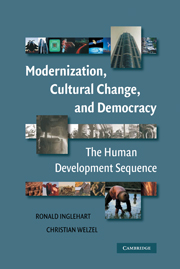Book contents
- Frontmatter
- Contents
- Dedication
- Acknowledgments
- Foreword by Hans-Dieter Klingemann
- Introduction
- PART I THE FORCES SHAPING VALUE CHANGE
- 1 A Revised Theory of Modernization
- 2 Value Change and the Persistence of Cultural Traditions
- 3 Exploring the Unknown: Predicting Mass Responses
- 4 Intergenerational Value Change
- 5 Value Changes over Time
- 6 Individualism, Self-Expression Values, and Civic Virtues
- PART II THE CONSEQUENCES OF VALUE CHANGE
- Conclusion: An Emancipative Theory of Democracy
- Bibliography
- Index
4 - Intergenerational Value Change
Published online by Cambridge University Press: 05 September 2012
- Frontmatter
- Contents
- Dedication
- Acknowledgments
- Foreword by Hans-Dieter Klingemann
- Introduction
- PART I THE FORCES SHAPING VALUE CHANGE
- 1 A Revised Theory of Modernization
- 2 Value Change and the Persistence of Cultural Traditions
- 3 Exploring the Unknown: Predicting Mass Responses
- 4 Intergenerational Value Change
- 5 Value Changes over Time
- 6 Individualism, Self-Expression Values, and Civic Virtues
- PART II THE CONSEQUENCES OF VALUE CHANGE
- Conclusion: An Emancipative Theory of Democracy
- Bibliography
- Index
Summary
As Chapter 2 demonstrated, we find massive and consistent differences between the values held by the publics of developed and developing societies. These differences suggest (but do not prove) that socioeconomic development brings systematic shifts from traditional to secular-rational values and from survival to self-expression values.
The next two chapters present additional evidence of these changes. Chapter 5 shows how the publics of postindustrial societies moved toward increasing emphasis on secular-rational values and self-expression values during the period from 1981 to 2001. This shift is direct evidence that cultural changes in the predicted directions actually are occurring, though it only covers a period of twenty years. The present chapter examines the underlying patterns of generational differences that led to these changes. For we find that in developed societies, the younger generations emphasize secular-rational values and self-expression values much more highly than do the older generations. This result is precisely what we would expect to find if intergenerational value shifts were occurring.
Under some circumstances, one might argue that these age-linked differences simply reflect life-cycle effects, not intergenerational change – claiming that people have an inherent tendency to place increasing emphasis on traditional values and survival values as they age. If such a life-cycle effect existed, the younger cohorts would place more emphasis on secular-rational values and self-expression values than the older cohorts in any society. But this claim is untenable in the present case, for these intergenerational differences are found in developed societies but not in low-income societies.
- Type
- Chapter
- Information
- Modernization, Cultural Change, and DemocracyThe Human Development Sequence, pp. 94 - 114Publisher: Cambridge University PressPrint publication year: 2005
- 1
- Cited by



